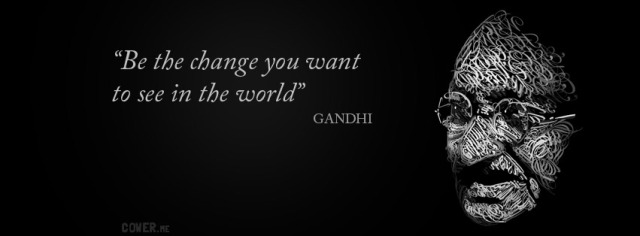Transmogrification
“To revolutionize the world, start by revolutionizing yourself.” Gandhi was a man who stood up for nonviolence, self-rule (independence), and the truth, but before he could impose these justifications on his fellow Indians, he had to practice it, understand it, and live by it. A man who is not changed can in no way change others. The first step Gandhi took towards achieving his goals was to separate himself from the British culture; he changed his way of thinking, also the way he dressed. He totally embraced his ancestral lifestyle and became the change he wanted to see.

From Home Rule to Total Freedom
Due to Gandhi’s academic background in South Africa, it became vividly clear that the British colonials only dominate colonies for their own benefits, and not necessarily for the benefits of those they rule. Using the Master-Slave Dialectic, Gandhi realized that the masters were also indirectly dependent on the Indians, even though it was not apparent to both the British Colonials and the Indians (who were informally regarded as slaves). At this point in time, Gandhi introduced the concept “Swaraj,” to nonviolently fight against injustice and the unscrupulous exploitation of man power. With time, Gandhi discovered that fighting against the colonial masters was not enough to solve the problem, he then moved away from the idea of “home rule” and decided to gain absolute freedom for India.

Thinking Global
“My method is conversion, not coercion… my ambition is much higher than independence. Through the deliverance of India, I seek to deliver the so-called weaker races of the earth from the crushing heels of Western exploitation” (Gandhi). From this rooted statement, we can extract two important things. Firstly, Gandhi used nonviolence as a means of converting the enemy. He understood that violence could have some beneficial adjustments, but its impact will only be temporary, and inefficient. Violence will only kindle the hatred of the enemy, but on the other hand, nonviolence will always overcome, by de-escalating the enemy’s hatred. Secondly, Gandhi’s actions might have seemed restricted to his local jurisdiction, but his intent was global. It is now obvious that Gandhi’s concept of Swaraj was not just limited to Indians alone, since they were not the only colony dominated by British colonials.

Swaraj and Religion
The concept of Swaraj can also be understood from a religious perspective, but this only must do with one’s personal mindset and belief system. “Gandhi held that… Swaraj is synonymous with Moksha or salvation” (Sonnleitner). “A truly moral person thus becomes one who not only gains a sense of self-respect (via tactical nonviolence) but also learns to respect the self or soul in him- or herself and others, requiring that nonviolence be accepted as a religious discipline” (Sonnleitner). Moksha could also mean subjecting the desires of the flesh/body to meet the desires of the spirit/soul. From a profound point of view, this concept of Moksha might be the most important and difficult aspect of Swaraj. The law of science says, ‘for every action there is an equal and opposite reaction,’ this can also be applied to us humans reacting to one another. Normally, the Indians could have avenged the unfair rule of the British, but this will be against the law of Moksha, which made them endure pain without complaint and retaliation. This level of Swaraj will also establish an atmosphere of respect, orderliness and self-control, it might take time for such to be established, but the certainty of the outcome is most likely to be positive.

Moksha and Purna Swaraj
Gandhi also introduced a rule of Indians by Indians, which is formally called Purna Swaraj, which can also be referred to as political independence. This level of Swaraj has little impact compared to Moksha Swaraj, but it is still part of what makes independence what it is today. “Gandhi believed that not to have achieved this low level of self-rule tends to produce in a population a subconscious (if not conscious) feeling of low self-worth, cultural inferiority…even if the rule was benevolent, the danger of breeding a complacent or slave mentality would remain” (Sonnleitner). In other words, if the Indians remained under the dominance of the British rule, they will still be regarded as slaves, irrespective of what they enjoy. If Gandhi had not introduced the concept Purna Swaraj, the Indians will be unable to live up to their personal dreams, because whatsoever they do will firstly benefit the British, while the remnants comes back to them. This level will also open doors for Indians to elect their own representatives (district rulers), while making sure that there is mutual help amongst neighbors and villagers. “On its third level of meaning, Gandhi conceived Swaraj as Hind Swaraj, ‘the rule of all people, the rule justice,’ which consists of the sovereignty of the people based on pure moral authority” (Sonnleitner).


